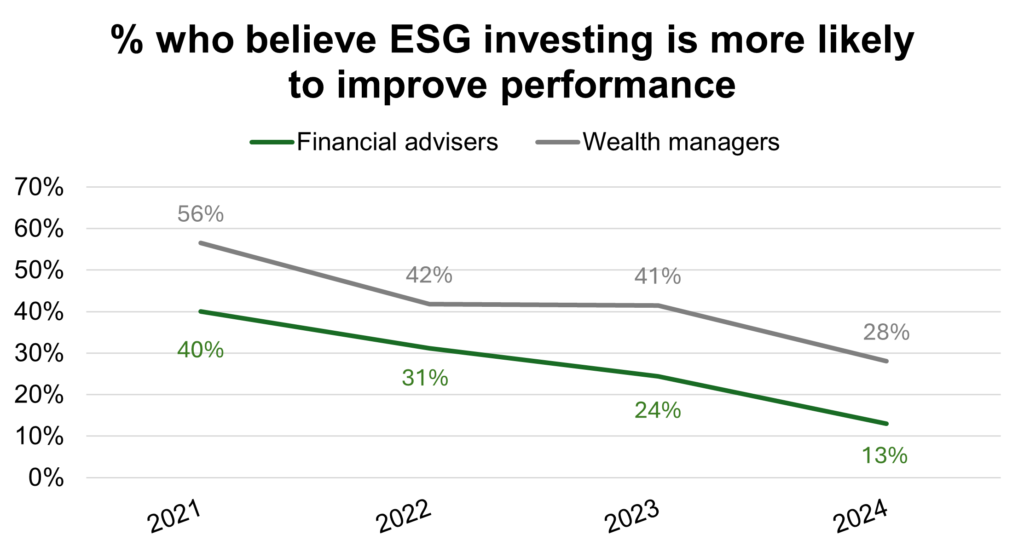The new FCA labels will increase trust in sustainability claims for most financial advisers and wealth managers, according to the annual ESG Attitudes Tracker from the Association of Investment Companies (AIC).
Nearly two-thirds (64%) of intermediaries said the labels would increase their trust, with this number higher among wealth managers (78%) than financial advisers (55%). The study was carried out by Research in Finance among 202 intermediaries as part of the ESG Attitudes Tracker, which also covers private investor sentiment towards ESG.
Of the four labels, the Sustainability Focus label is most likely to be used for screening purposes, with 54% of intermediaries saying they would use it in this way. The Sustainability Impact label was the second most popular (52% of respondents), followed by Sustainability Improvers (47%) and finally Sustainability Mixed Goals (37%).
However, there were concerns about the low numbers of funds with labels, as well as how labels (or lack of them) could affect funds that intermediaries currently use. One wealth manager commented: “I don’t know where the funds I’ve got are going to end up sitting on those labels. I’ve got some that are based in Ireland, so they’re not going to be subject to it… My concern will be whether there are enough companies that can make a diversified portfolio.”
The labels have been positively received among private investors. Nearly two-thirds of private investors surveyed (63%) said they would increase their trust in funds’ sustainability claims, with this rising to 71% among those who held sustainable investments already.
Nick Britton, Research Director of the Association of Investment Companies (AIC), said: “Advisers and wealth managers have given a cautious welcome to the FCA’s new labels; it’s clear they would increase trust and that many would use them for screening purposes. However, questions remain about whether the universe of labelled funds will be large and diverse enough to build a portfolio, as well as concerns about what happens to funds that have been presented as sustainable but don’t claim a label.
“One key concern is that the labelling regime currently only applies to UK funds, excluding those based overseas. This means that many of our member companies in the renewable energy infrastructure sector, for example, are outside the scope of the regime, though they may have impeccable environmental credentials.”
Attitudes to ESG investing and performance
Opinions on ESG investing in general appear to be stabilising, with 57% of intermediaries saying there had been no change in their opinion since last year, 24% saying it had grown more favourable, and 17% less favourable. This is in contrast to previous years, in which opinions had shifted more strongly in a more favourable direction.
Nearly three quarters (73%) thought that investing should make a positive difference as well as provide a financial return, the same as last year. Intermediaries generally associated ESG with positive words, with 85% opting for “sustainable” and 80% “responsible”, but only 16% “woke” and just 4% “pointless”.
However, expectations of performance have shifted more sharply. Only 19% of intermediaries expect ESG investing to improve performance, compared to 30% who said it would worsen performance. Optimism has trended downwards since 2021, when 47% of respondents thought ESG investing would help performance, and only 16% thought it would be a hindrance. Wealth managers are more optimistic about performance than advisers.

Source: AIC/Research in Finance
One adviser commented: “One of my clients has always been an ESG investor and things have gone awry. And she came back to me and said, and she used these words herself, can we start doing a softer ESG approach?”
Others believe the performance of ESG strategies is likely to be cyclical. Another respondent remarked: “Like with anything, as soon as these things start to pick up again, we’ll start getting a flood of people that are interested in ethical investing once again.”
Demand for ESG
Most respondents (60%) expect demand for ESG strategies to increase over the next 12 months, with only 10% expecting it to decline. However, comparisons with previous years suggest that this growth in demand is slowing. In 2021, 91% of respondents expected demand for ESG to increase, declining to 80% in 2022 and 72% in 2023.
But the percentage of intermediaries recommending sustainable funds has held steady at 89%, the same as in 2021. On average, 18% of client assets are held in sustainable funds, similar to previous years.
The percentage of clients who proactively raise the topic of ESG in meetings has declined to 13%, from 20% in 2022 and 15% in 2023. Yet intermediaries believe client appetite is still the main driver of ESG demand, with 53% of respondents holding this view.
Views on ESG ratings and reporting
The perceived usefulness of third-party ESG fund ratings has steadily declined, with 60% of respondents finding them helpful compared to 73% in 2022 and 65% in 2023. Only 21% of intermediaries say they trust ESG ratings.
Of those who refer to asset managers’ ESG reporting, around two-fifths (42%) are satisfied with all or most of it – a similar result to previous years. The most useful ESG disclosure is considered to be the overall social and environmental impact of a fund versus its benchmark, with 71% of respondents finding this to be important, followed by details of any positive screening policy (69%), the asset manager’s experience or track record in ESG investing (67%), a detailed impact report for each fund including case studies (67%), and details of negative screening or exclusions (63%).















